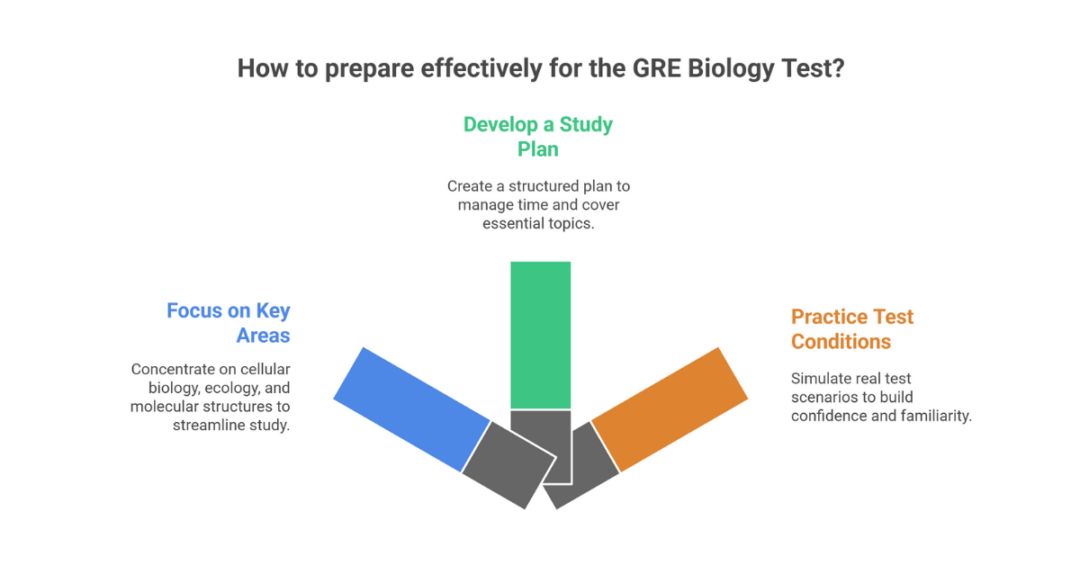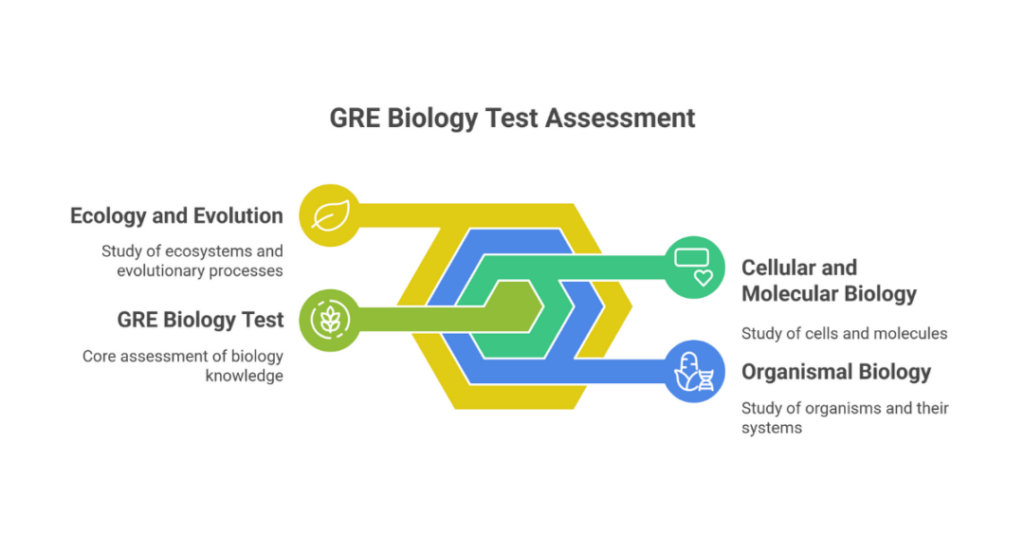3 September 2025
6 minutes read
GRE Subject Biology: How To Prepare For The GRE Biology Test? A GRE Subject Test Guide for Indian Students

Key Takeaways
- GRE subject biology tests knowledge in cell biology, molecular biology, and ecology, making it essential for graduate admissions in life sciences.
- GRE subject biology helps students showcase strong subject expertise, boosting applications for competitive master’s and PhD programs abroad.
- GRE subject biology requires focused preparation with past papers and guides, ensuring higher scores for better university opportunities.
The GRE Biology Test can feel a bit like taking one shot to learn everything about the natural world: the cell cycle; evolutionary processes; organismal biology; cellular and molecular biology, etc. While this kind of information might be interesting to a biologist, it can leave even the most studious test taker feeling like they are swimming upstream.
Faced with 2 hours and 50 minutes of multiple-choice questions, it is easy to feel overwhelmed and paralyzed about where to begin. Here is the good news: we don’t expect you to know every little detail. But we expect you to pay attention to the details that matter to you, in this case cellular biology, ecology, molecular structures, etc.
With a focused GRE action plan and an idea of what’s on the test, it is totally feasible to emerge from this with the desired test outcome, as long as you use your time effectively. This guide can help you streamline your GRE Cell Cycle and Molecular Biology preparation so that you study not only hard but smart.
What Is The GRE Subject Biology Test?
The GRE Subject Test for science students is an advanced standardized test to examine your understanding of biology (from cellular biology to ecology to evolutionary processes). It tests knowledge in biology in more depth than the general GRE exam. In the GRE subject test, your knowledge is tested in a list of specific biology topics (i.e., morphogenesis and gene regulation).

The Biology GRE Subject Test consists of approximately 190 multiple-choice questions that represent a range of Undergraduate-level biology, and your score yields subscores in three major areas: cell and molecular biology; organismal-biology; ecology and evolution. Programs in biology will use this information to evaluate your readiness for advanced study in graduate courses in biology.
How to Prepare for the GRE Biology Exam (GRE Subject Test)?
The GRE Biology Subject Test consists of approximately 190 multiple-choice questions that delve into topics such as cellular-biology, ecology, organismal-biology, and cell biology. Since a lot of applicants to graduate programs in biology must take this standardized test, it is essential to prep properly, while also have solid GRE study plan if required by the admission process.
Understand the Test Format and Major Areas
Like every other exam including the IELTS, TOEFL, GMAT and SAT, the GRE Subject Test in Biology assesses your knowledge in three main areas of biology -cellular and molecular biology, organismal biology, and ecology and evolution.
The questions tend to cover introductory biology material that you will have learned during the first three years of your American undergraduate degree in biology. You will be given a total score, as well as subscores in each of the major sections, so it is helpful to know that you are doing on the test.
Gather the Right Study Materials
Begin your preparation by collecting the best resources to prepare for the GRE Biology Test. Some of the best GRE Biology Test preparation books are Cracking the GRE biochemistry Subject Test and official ETS materials.
These resources contain detailed descriptions of biology topics that appear in official GRE content, many sample practice questions, and sometimes diagrams or results to analyze. The best approach will focus on the materials that highlight the areas you are weakest, to improve your overall performance.
Review Core Concepts with a Focused Plan
Because the test will encompass so many topics, I would recommend that you try to review fundamental areas such as gene expression regulation, cellular structures and functions, and morphogenesis.
Essentially, it may be helpful to break down your study sessions by subject area, as covered on the GRE. For example, you may spend a study session understanding cellular structure, organismal biology, and laboratory and field context that may appear on the test.
Practice with Real Test Conditions
Take practice tests as closely to actual test conditions as possible so you can practice pacing yourself. Building your stamina is important because the GRE Biology Test is 2 hours and 50 minutes long. The Education Testing Service (ETS) can give you the closest sample questions and formats to the GRE® Biochemistry test.
Track Your Progress and Focus on Weak Areas
Use your results from practice tests to help you identify weak spots. Are you having difficulty with more questions in cellular biology or evolutionary-processes? Subscores will help you prepare. You will do well to devote your preparation toward areas you may get some points away at the end.
Utilize Fee Reduction Programs and Test Dates
Don’t forget that the difference between the GRE Subject Test and the GRE general test is only offered three times a year and that your individual scores in scaled for comparison. You can check to see if you are eligible for a fee reduction program, if you feel stressed about costs.

A lot of bachelor degree graduates or undergraduate students will be graduating and could apply for this financial aid opportunity for master programs in the United States.
6 Best Books For GRE Biology Test Preparation (GRE Biology Subject Test and Practice Test)
Having the right resources is paramount when studying for the GRE Biology Subject Test.
By having the right resources, you can effectively focus on the key topics in biology to propel yourself ahead of the competition. Here are six of the top resources that can best help you study!
1. Cracking the GRE Biology Subject Test by The Princeton Review
Yes, this book was mentioned in many of the reviews above, but that is because its so widely recommended! The book provides a solid review of the biology disciplines on the GRE sections, cellular and molecular biology, organismal biology and ecology.
There are plenty of detailed explanations, practice questions and diagrams you could use to help prepare for the GRE, they could be helpful for both the novice and the more experienced test taker.
2. Kaplan’s GRE Biology Study Guide
Kaplan is synonymous with clear study guide material. Kaplan provides a focused study guide on gene regulation, evolution and cellular biology in their biology study guide. Kaplan also provides practice questions and strategies to addressing the difficult format! Kaplan provides thorough explanations for every practice question on both a concept and a thought process!
3. ETS Official GRE Biology Subject Test Practice Book
Being from Educational Testing Service (ETS) which oversees the GRE, this book is very useful in knowing how the test is structured. The book contains former GRE test format, with explanations accompanying each test, along with a synopsis of some of the major subject area.
4. Campbell Biology
This textbook is not a GRE Biology Test-specific textbook, but rather a comprehensive resource for all biology students. Campbell Biology provides an overview of almost all biology topics, from cell structure to ecology.

Increased familiarity with content material will benefit you greatly, especially if you wish to look in detail into specific areas.
5. Barron’s GRE Biology Practice Exams
Barron’s has a set of test papers that focus closely on the same format of the real test. If you are hoping to simulate the experience of the GRE biology test, Barron’s sets are for you. Barron’s also focuses on the broader subjects of molecular biology and evolutionary forces, with a detailed breakdown of answers.
6. Mader’s Biology by Sylvia Mader
Mader’s Biology is another great undergraduate textbook covering the basic requirements for the GRE. It’s particularly strong in areas of cellular biology, genetics, and organismal biology, and it’s simple and easy to understand with diagrams and explanations to improve learning.
Conclusion
Ultimately, what matters is not perfection–it’s preparation. You’ll end the GRE exam with an enhanced understanding of biology, and that will surely put you one step closer to your graduate school dreams.
In short, there is no comparison between smart preparation and last-minute panic. The books and strategies described here can help you navigate the major topics, while also letting you practice smartly, and come test day you can be confident that you are ready.
Master the GRE and pave your way to academic success with Ambitio. Our expertly crafted resources and targeted preparation approach are designed to build your confidence and proficiency, helping you secure a top percentile score that opens doors to prestigious graduate programs.
FAQs
What is GRE subject biology and who should take it?
GRE subject biology is a standardized test for students applying to graduate programs in biological sciences. GRE subject biology is ideal for those aiming at master’s or PhD studies abroad.
What topics are covered in GRE subject biology?
GRE subject biology covers cell biology, molecular biology, genetics, ecology, and evolution. Preparing for GRE subject biology requires strong fundamentals across these areas.
How is GRE subject biology scored?
GRE subject biology is scored on a scale of 200 to 990 in 10-point increments. A higher score in GRE subject biology can significantly boost admissions chances.
When is GRE subject biology conducted?
How to prepare effectively for GRE subject biology?
Effective preparation for GRE subject biology includes reviewing textbooks, solving past papers, and practicing mock tests. Time management is crucial for GRE subject biology success.
Which universities accept GRE subject biology scores?
Is GRE subject biology mandatory for all biology programs?
GRE subject biology is not mandatory for every program but is highly recommended for competitive schools. Submitting GRE subject biology scores often gives applicants an edge.

You can study at top universities worldwide!
Get expert tips and tricks to get into top universities with a free expert session.
Book Your Free 30-Minute Session Now! Book a call now




























